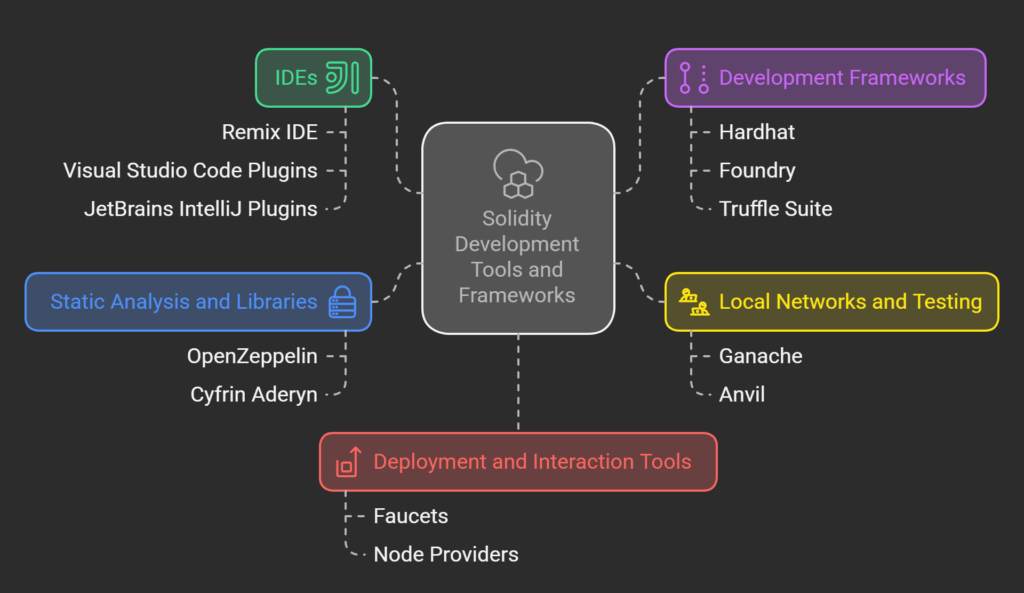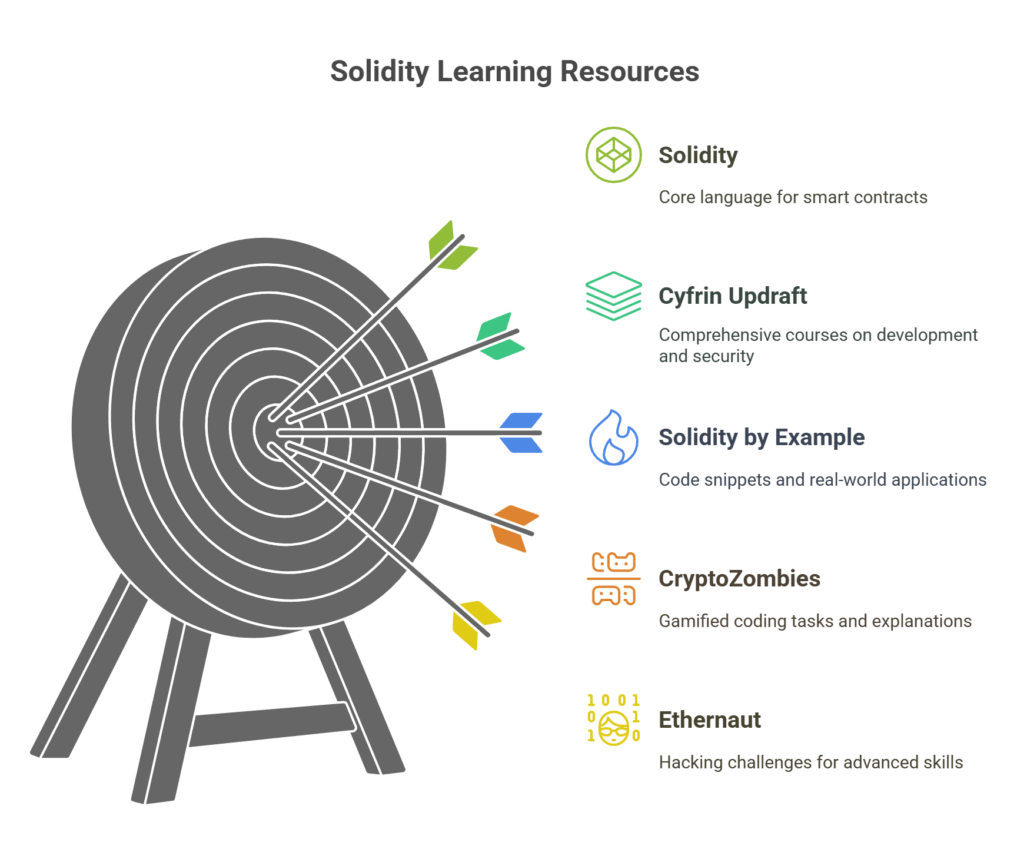Solidity Development Tools and Frameworks

Solidity developers may create, test, and implement smart contracts safely and effectively with the help of an extensive ecosystem of tools and frameworks:
IDEs, or integrated development environments:
- Remix IDE: A well-known browser-based IDE for Solidity smart contract development, editing, compilation, deployment, testing, and debugging. It also provides a Visual Studio Code plugin and a desktop IDE.
- Solidity plugins for syntax highlighting and IntelliSense can be used with Visual Studio Code and JetBrains IntelliJ.
Frameworks for Development:
- JavaScript-based Hardhat simplifies smart contract creation, testing, and deployment by providing debugging, testing, and compilation tools.
- Foundry, known for its speed, accelerates smart contract generation, testing, and implementation. Anvil (a local Ethereum network), Cast (for transaction creation and blockchain interaction), Forge (for compilation, deployment, and testing), and Chisel (a REPL tool) are some of its constituents.
- Truffle Suite: An Ethereum asset pipeline, testing framework, and development environment.
Local networks and testing:
- Ganache: An Ethereum development personal blockchain that enables local testing and contract deployment.
- Anvil: The local Ethereum network used by Foundry for contract testing and debugging.
Static analysis and libraries:
- OpenZeppelin: Offers tools for smart contract upgrades as well as smart contracts for widely used standards like ERC-20 and ERC-721.
- Cyfrin Aderyn is a Solidity smart contract static analyser built on Rust that assists in identifying code vulnerabilities.
Tools for Deployment and Interaction:
- Faucets: Offer free testnet Ethereum or other tokens (like the Sepolia Faucet) so that development and testing may be done without actual money.
- Node Providers: Services such as QuickNode, Alchemy, and Infura provide scalable infrastructure for blockchain interaction, facilitating transaction sending, data reading, and deployment. An alternative that is decentralised is offered by Ankr.
Blockchains Supporting Solidity
Solidity was first created for Ethereum, but many other blockchain networks have adopted it because to its adaptability. Solidity is supported by these blockchains, enabling programmers to create and implement smart contracts on many platforms:
- Ethereum.
- Avalanche.
- Polygon.
- BNB Chain, formerly known as Binance Smart Chain.
- Ethereum Layer 2 scaling options include Optimism, Arbitrum, and ZKsync.
- Others include Tron, Hedera Hashgraph, Ethereum Classic, Metis, and Counterparty (which is based on Bitcoin).
Security Considerations
Once implemented, smart contracts cannot be changed, which boosts confidence but also leaves them extremely open to assaults or permanent losses in the event that there are flaws or weaknesses.
- One prominent instance is the 2016 DAO issue, which caused the Ethereum network to hard fork.
- Solidity’s Turing-completeness makes automating security property verification difficult. Automatic solutions may miss crucial transgressions, cause false positives, and lack code coverage.
- Solidity’s counterintuitive design, lack of structures for blockchain-specific features, and inadequate central documentation of known vulnerabilities have all been cited as reasons for its error-proneness. It has been held accountable for adding security vulnerabilities to contracts that the community and language designers failed to notice.
Prior to implementation, code audits are essential for guaranteeing the security and accuracy of smart contracts in order to reduce these risks. Among the suggested practices are:
- Including routine testing.
- Utilising current libraries.
- Referring to Solodit and other databases of known vulnerabilities.
- Hiring private auditors for thorough evaluations, such as Cyfrin, OpenZeppelin, Trail of Bits, and Guardian Audits.
- Conducting competitive audits to find vulnerabilities using tools like CodeHawks, Code4rena, and Cantina. Comprehensive security can be ensured by combining competitive and private audits.
Popularity and Learning Resources

Solidity is the most popular blockchain smart contract programming language. It is the native language for EVM-compatible smart contracts and widely used across several chains and rapidly growing dApp ecosystems.
There are numerous top-notch resources accessible for anyone interested in studying Solidity:
- Cyfrin Updraft: Provides thorough, free courses covering everything from basic to advanced subjects in smart contract development and security.
- Solidity by Example: A compilation of succinct, understandable code fragments and real-world applications.
- CryptoZombies: A gamified manual featuring coding tasks and detailed explanations.
- The official Solidity documentation offers thorough reference materials, common patterns, and syntax explanations.
- The official Ethereum website provides community support, developer resources, tutorials, and tools.
- One of the bootcamps offered by Alchemy University is a free seven-week Solidity bootcamp.
- Ethernaut by OpenZeppelin: A war game for hacking challenges based on smart contracts.
